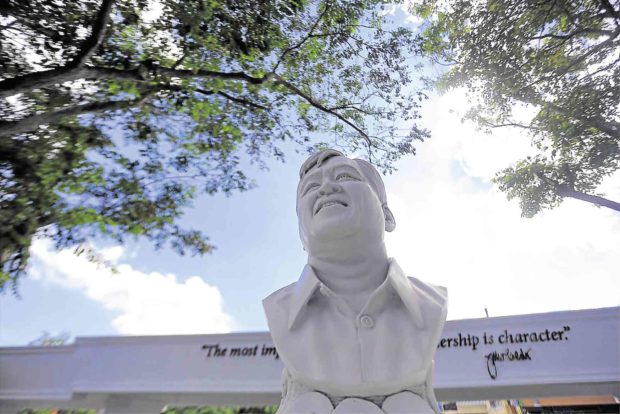
Bust of Jesse Robredo in front of the Naga City Hall.
NAGA CITY—Covered with lawn grass that runs in semicircle, a museum dedicated to the late Interior Secretary Jesse Robredo is designed with a frontage similar to open arms, gesturing visitors to come and explore.
Architect Gian Paolo Priela, the museum’s designer, said no trees had been cut in the former playground.
Officially named Museo ni Jesse Robredo (MJR), the museum will open today, the fifth death anniversary of the longest-serving mayor of Naga City. A Mass at the tomb of Robredo will be celebrated before the museum accepts visitors.
Robredo died when his plane, which was taking him home to Naga City from Cebu City, crashed off the coast of Masbate province in 2012, when he was secretary of the Department of the Interior and Local Government (DILG).
“The [museum] design is site contextual. It answered the need of the site [and] it also reflected the personality of Mayor Jesse. Unlike other museums that are grand and monumental, this one is very down-to-earth,” Priela said, describing the concept of the P9-million museum at the Naga Civic Center here.
Robredo’s life-size bronze sculpture sitting on the ground in front of the building greets visitors.
“Normally, you see sculptures mounted on a podium and held high. But that’s not Jesse Robredo at all. We see Jesse Robredo as accessible, humble … that’s why we depicted him in shirt and short pants,” Priela said.
The sculpture was made by Jun Vicaldo. Written on each of the three pillars behind the sculpture are “Matino (sensible), Mahusay (competent), Matapat (honest)”—qualities that Robredo said a public servant must possess.
Robredo, husband of Vice President Leni Robredo, received the 2000 Ramon Magsaysay Award for Government Service and earned the good governance icon for his innovations in making the city government transparent and accessible to its constituency, which national and international institutions, like the United Nations, had recognized several times.
‘Tsinelas’ leadership
The museum’s second floor hosts four galleries narrating Robredo’s story.
The first gallery features Robredo’s childhood and student days.
The story about Robredo’s trademark “Tsinelas Leadership” is narrated in the second gallery, where his life in public service, as Naga mayor and DILG secretary, is featured.
“It is the biggest gallery and shows Robredo’s body of work and his innovations on good governance. There’s a mock-up of the conference room where he used to hold office in City Hall and the awards he received,” Priela said.
The third gallery, themed “Sa mata ng tao, sa puso ng mamamayan (In the eyes of man, in the heart of the people),” is about how people perceived Robredo, featuring testimonials from ordinary Nagueños and his family and relatives.
This gallery is fun and interactive where visitors are encouraged to write letters on an iPad and send them to someone using the appropriate doodles from an app, Priela said.
The doodles, he said, were what Robredo drew in his letters to his daughter Aika.
A stationary bicycle in front of a video screen is also on display, which visitors can use to take a virtual tour of Naga. Aside from his signature flip-flops (tsinelas), Robredo was also known to ride a bike as he went around the city.
Favorite shirt
Priela said they included in the third gallery Robredo’s favorite pink striped shirt that he bought at an ukay-ukay (used clothes shop). He had worn this shirt several times during different occasions.
“It was so funny because when we were looking at his (Robredo’s) pictures, the pink striped shirt was everywhere. You could see that these (pictures) were different events because [the shirt] was worn with different pants, shoes, coats and jackets and backgrounds. I think he was already using that [shirt] when he was still mayor of Naga City. When he was already DILG secretary, he was still using that shirt,” said Rochelle Priela, Gian Paolo’s wife, who oversaw work progress at the museum.
Rochelle said Robredo’s clothes and office uniforms would be included among the items to be displayed in the third gallery.
Final journey
The final gallery resembles a fuselage and called “Legacy,” according to Priela.
He said visitors would be taken to Robredo’s journey from the time he left Cebu City on board a light plane up to his burial.
“It’s like a timeline. Visitors will see frame by frame what happened starting Aug. 18, 2012, the retrieval of the body, the wake at the Archbishop’s Palace in Naga City, the wake in Malacañang, the return of Robredo’s casket to Naga City and the burial,” Priela said.
He said the gallery also features audio, video and photo exhibits, presented as flash reports, about the plane crash, the retrieval operation in Masbate and the wake. Other items on display include the souvenir program of the last event that Robredo had attended in Cebu and his travelling bag.
“Towards the end of the exhibit, we are showing the different posthumous awards given to Robredo by different institutions and boxes [featuring] the places or organizations named after him,” Priela said.
But the MJR building is more than a museum with an auditorium, a coffee shop, a souvenir store, gallery for changing exhibits and the office of the Naga City Good Governance Institute.
On top of the museum building is a 900-square meter area covered with lawn grass that doubles as playground or a place for stargazing.
A brainchild of the Naga City government under Mayor John Bongat, the museum’s construction is undertaken in partnership with the National Historical Commission of the Philippines.